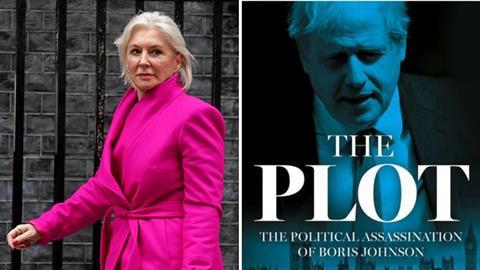Former MP Nadine Dorries’ new book contains a series of shocking allegations of rape, sexual abuse and misogyny in the halls of Westminster. Tragically, it’s nothing new, says Bekah Legg. Christians and churches need to equip themselves to respond appropriately

This week sees the release of former Culture Secretary, Nadine Dorries’ controversial book, The Plot: The political assassination of Boris Johnson (HarperCollins). Parts of it have already been serialised in newspapers, with bombshell allegations - including that the Tory party covered up rape disclosures about a sitting MP, paying for the rape victim’s medical treatment but not reporting it to the police. These stories are making headlines across the world.
There are not enough substantiated details to discuss the case in point, but as shocking as this would be if proven true, it’s important to realise that it would not be a lone case. Things like this happen all the time.
Turning a blind eye
My husband and I are currently watching The Morning Show on Apple TV. It’s a brilliant series, portraying the fallout after a fictional presenter is exposed as a sexual predator. It cleverly explores how the institution colluded by paying off victims, giving them promotions or generally hushing things up so that the shine of their money-making ‘star’ was not tarnished.
I have heard far too many stories which sound like the allegations in Dorries’ book
It explores how many of the team chose to look the other way rather than accept the reality of what was happening in their studio, and how it is easier to create a narrative about difficult or scheming women than to take your hero off their pedestal.
The Morning Show was created in the wake of the Weinstein cases and the #MeToo movement. It is a thought-provoking drama with more than a passing resemblance to the issues raised by recent allegations against British comedian Russell Brand. Most importantly, it shows the devastating impact on victims when they are not believed or supported.
Bad theology
I lead an organisation that works to equip the Church to recognise and respond to domestic abuse and support survivors. We have an online community of just over 600 Christian women who have been subjected to domestic abuse, and I have heard far too many stories which sound like a version of The Morning Show, or the allegations in Nadine Dorries’ book. Women who haven’t been paid off or sent to private therapy but who have been silenced, told not to make a fuss and sometimes, devastatingly, to go back to their abuser and submit to the abuse.
Sometimes that is because of a church’s theology around marriage (which is an issue for another article). But often, it’s about not wanting to confront the reality that a man who is liked and respected could possibly be doing these things. At other times, it’s about protecting the institution, and not wanting the church brought into ‘disrepute’ by bringing the abuse into the open, as if telling the truth was the problem.
The result on those who have been abused is devastating.
Imagine, if you can, being continually hurt by the person who is meant to love and protect you. Then take that pain and multiply it by a factor of 10 because the Church that was meant to love you instead sidelines you, silences you and fails to protect you as well.
It doesn’t bear thinking about, does it?
Yet it happens. It happens with domestic abuse, with sexual assault and it happens with spiritual abuse. In the last few years, we’ve seen far too many cases of victims silenced while their abusers are protected.
Choosing better
It’s why Restored are so passionate about training and resourcing the Church to respond well. We know that the Church should be a safe space, where those who have been let down by the world can find refuge; where justice rolls like a river and those who have been oppressed can find love and freedom.
And we know that there are some amazing churches around the UK doing just that, because for all the stories that break my heart in our Survivors’ Network, there are stories of hope, of churches who have believed victims of abuse, helped them to rediscover their worth and live in freedom. Those churches brighten my day and keep me going.
We’ve seen far too many cases of victims silenced while abusers are protected
In the heat of an unexpected disclosure, it is easy to say the wrong thing, even inadvertently. But when we have chosen to plan for that scenario, to train our teams and prepare policies and procedures, we are far more likely to get it right.
Some of the responses to Nadine Dorries’ allegations speak to this and call for a standardised response to abuse disclosures. It makes sense. In truth, it’s safeguarding at its very simplest. It’s something we can all do, and should do.
Let’s start turning a culture that enables abusers to look a lot more like the Kingdom of God.






































No comments yet